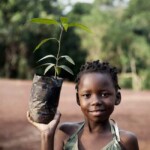
Poverty in America and the world at large is pervasive, though few regard it as the most pressing social need of our time. Poverty seems to take a back seat to reducing taxes, increasing military power and revamping the healthcare plan. Considering the statistics below, perhaps it is time to place this issue at the forefront of our concerns as individuals and a country.
- The poverty line in the United States is considered $12,060 for individuals and $24,600 for a family of four.Over 43 million people in America live in poverty with over 19 million of those considered extreme poverty—meaning their family’s cash income is less than half of the poverty line.
- One in every two people in the U.S. falls into the classification of poor or low-income.
- The World View: 795 million people suffer from chronic undernourishment.
- 1 million children die annually due to under-nutrition.
- Poverty is the principal cause of hunger.
- The World Bank estimates that 1.44 billion people live in extreme poverty.
These heartbreaking statistics are sharpened by the fact that the world produces enough food to feed everyone. The problem for many is that they do not have sufficient income in order to purchase the food that is available.
Social Entrepreneurs are Making a Difference
Paul Collier, a professor of economics at Oxford University and previous director of the development research group at the World Bank, believes that social entrepreneurship could be the best solution. And there are social entrepreneurs that seem to agree. These four have stepped up to the plate in the fight against world poverty and hunger.
Kenya’s economic downturn began in the 1980’s. Since that time, small-scale farmers have existed on subsistence farming, barely surviving at the poverty level.
Haron Wachira saw a need and filled it by connecting subsistence farmers with agro-processing businesses.
The first step was finding under-performing processing companies who agreed to sell part of their stake to a group of farmers. The second step was organizing farmers who were producing the raw material the processing company needed into groups of 10 households.
This group supplies the material at a subsidized cost and is trained in financial as well as product management. These products are placed under the brand name of “Akili” which means knowledge.
Currently, products being produced, processed and marketed include coffee, herbs, leather, supplements and fresh fruit beverages under names such as Akili Honey and Akili Aloe Vera. The United Nations Development Programme recently recognized his work.
These two young social entrepreneurs are guided by one mission: to help reduce food waste and help the 50 million Americans who do not know where they are going to get their next meal. These University of California alumnus are winners of the UC Global Food Initiative Awards for those under 30.
Ahmad founded Copia—an organization named after the goddess of abundance. It uses a mobile app and website to connect businesses, universities and events that have produced excess food to those communities that are in need. As of mid-2016, it had fed 700,000 people by recovering 800,000 pounds of food.
Sumekh co-founded Swipe Out Hunger which allows college students to donate excess dollars on their meal plan. The company has served over 1.2 million meals around the country and was named a White House “Champion of Change.”
Jake Harriman founded Nuru International, a company whose mission is to end extreme poverty which he believes is the “greatest humanitarian crisis of our time.”
It is based on models of sustainability and reaches out to isolated and impoverished rural areas around the globe. Its goal is to create effective solutions for communities by giving local leaders the tools and knowledge they need to fight hunger and disease and to promote education.
They help build self-reliance through farming, adopting health conscious habits in homes such as the use of mosquito netting and treated water, as well as education outreach programs.
These social entrepreneurs teach us that change can and does begin with just one person that sees a need and becomes determined to fill it. “We must remember that one determined person can make a significant difference, and that a small group of determined people can change the course of history.”—Sonia Johnson
You might also enjoy:






